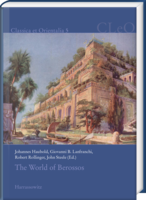|
|
Download:
Berossos was a priest and historian from Babylon. A contemporary of Alexander the Great and the first Seleucid kings, he wrote a history of the world in Greek and for a Greek audience, but articulating his Babylonian perspective: he told Greek conquerors about the culture they had conquered. The Babyloniaca, as the work was probably called, was influential through the ages: in antiquity, it was quoted directly or indirectly by such diverse thinkers as Alexander Polyhistor and Eusebius. The text was lost in the middle ages but continued to be read in fragments and paraphrases. When the fragments were reassembled (and indeed forged) in the Renaissance, Berossos found himself at the heart of crucial debates about authenticity, scholarship and the shape of divine and human history.
This edited volume, the first ever devoted to Berossos and his work, brings together leading scholars from a range of academic disciplines, including Classics, Assyriology, Iranology, Ancient History, Patristics, the History of Science and Renaissance Studies, to reassess the life, work and reception of one of the most fascinating and elusive figures in antiquity. The picture which emerges speaks powerfully of the enduring links between the classical world and the Ancient Near East; links which have profoundly shaped the development of European literature, culture and thought. |




